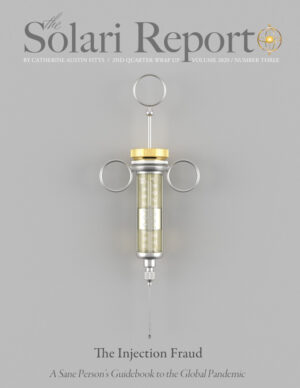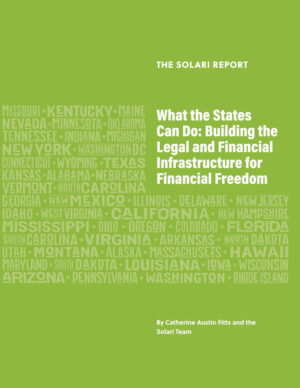If you have a comment about Financial Permaculture or the Financial Permaculture workshop in Hohenwald, Tennessee October 24-28, 2008, and are not sure where to put it, please place it as a comment to this post.
We welcome your input!
Thanks.
~ The Solari Team



 2nd Quarter 2020 Wrap Up: The Injection Fraud (132 pages)
2nd Quarter 2020 Wrap Up: The Injection Fraud (132 pages)  2020 Annual Wrap Up: The Going Direct Reset (174 pages)
2020 Annual Wrap Up: The Going Direct Reset (174 pages)  What the States Can Do: Building the Legal and Financial Infrastructure for Financial Freedom (64 pages)
What the States Can Do: Building the Legal and Financial Infrastructure for Financial Freedom (64 pages)
Add to my Bookmarks 🙂
S.L:
Thanks for the article on the landfill controversy. Any chance you know where we could get data on the garbage and waste flows that are helping to inspire plans for it? It would be fascinating to see if any of the people attending the conference had ideas on how the flow could be reduced or reengineered.
Catherine
I wish I could be there. This recent essay by economist Herman Daly, commonly referred to as the “Father” of ecological economics, is perfect for your workshop and for our times…
The current financial debacle is really not a “liquidity” crisis as it is often euphemistically called. It is a crisis of overgrowth of financial assets relative to growth of real wealth – pretty much the opposite of too little liquidity. Financial assets have grown by a large multiple of the real economy – paper exchanging for paper is now 20 times greater than exchanges of paper for real commodities. It should be no surprise that the relative value of the vastly more abundant financial assets has fallen in terms of real assets. Real wealth is concrete; financial assets are abstractions – existing real wealth carries a lien on it in the amount of future debt.
The value of present real wealth is no longer sufficient to serve as a lien to guarantee the exploding debt. Consequently the debt is being devalued in terms of existing wealth. No one any longer is eager to trade real present wealth for debt even at high interest rates. This is because the debt is worth much less, not because there is not enough money or credit, or because “banks are not lending to each other” as commentators often say.
Can the economy grow fast enough in real terms to redeem the massive increase in debt? In a word, no. As Frederick Soddy (1926 Nobel Laureate chemist and underground economist) pointed out long ago, “you cannot permanently pit an absurd human convention, such as the spontaneous increment of debt [compound interest] against the natural law of the spontaneous decrement of wealth [entropy].”
The population of “negative pigs” (debt) can grow without limit since it is merely a number; the population of “positive pigs” (real wealth) faces severe physical constraints. The dawning realization that Soddy’s common sense was right, even though no one publicly admits it, is what underlies the crisis. The problem is not too little liquidity, but too many negative pigs growing too fast relative to the limited number of positive pigs whose growth is constrained by their digestive tracts, their gestation period, and
places to put pigpens. Also there are too many two-legged Wall Street pigs, but that is another matter.
Growth in U.S. real wealth is restrained by increasing scarcity of natural resources, both at the source end (oil depletion), and the sink end (absorptive capacity of the atmosphere for CO2). Further, spatial displacement of old stuff to make room for new stuff is increasingly costly as the world becomes more full, and increasing inequality of distribution of income prevents most people from buying much of the new stuff-except on credit (more debt). Marginal costs of growth now likely exceed marginal benefits, so that real physical growth makes us poorer, not richer (the cost of feeding and caring for the extra pigs is greater than the extra benefit). To keep up the illusion that growth is making us richer we deferred costs by issuing financial assets almost without limit, conveniently forgetting that these so-called assets are, for society as a whole, debts to be paid back out of future real growth. That future real growth is very doubtful and consequently claims on it are devalued, regardless of liquidity.
What allowed symbolic financial assets to become so disconnected from underlying real assets? First, there is the fact that we have fiat money, not commodity money. For all its disadvantages, commodity money (gold) was at least tethered to reality by a real cost of
production. Second, our fractional reserve banking system allows pyramiding of bank money (demand deposits) on top of the fiat government-issued currency. Third, buying stocks and “derivatives” on margin allows a further pyramiding of financial assets on top the already multiplied money supply. In addition, credit card debt expands the supply of quasi-money as do other financial “innovations” that were designed to circumvent the public-interest regulation of commercial banks and the money supply. I would not advocate a return to commodity money, but would certainly advocate 100 percent reserve
requirements for banks (approached gradually), as well as an end to the practice of buying stocks on the margin. All banks should be financial intermediaries that lend depositors’ money, not engines for creating money out of nothing and lending it at interest. If every dollar invested represented a dollar previously saved we would
restore the classical economists’ balance between investment and abstinence. Fewer stupid or crooked investments would be tolerated if abstinence had to precede investment. Of course the growth economists will howl that this would slow the growth of GDP. So be it – growth has become uneconomic at the present margin as we currently measure it.
The agglomerating of mortgages of differing quality into opaque and shuffled bundles should be outlawed. One of the basic assumptions of an efficient market with a meaningful price is a homogeneous product. For example, we have the market and corresponding price for No. 2 corn – not a market and price for miscellaneous randomly aggregated grains. Only people who have no understanding of markets, or who are consciously perpetrating fraud, could have either sold or bought these negative pigs-in-a-poke. Yet the aggregating mathematical wizards of Wall Street did it, and now seem surprised at their inability to correctly price these idiotic “assets.”
And very important in all this is our balance of trade deficit that has allowed us to consume as if we were really growing instead of accumulating debt. So far our surplus trading partners have been willing to lend the dollars they earned back to us by buying treasury bills – more debt “guaranteed” by liens on yet-to-exist wealth. Of course they also buy real assets and their future earning capacity. Our brilliant economic gurus meanwhile continue to preach deregulation of both the financial sector and of international commerce (i.e. “free” trade). Some of us have for a long time been saying that this behavior was unwise, unsustainable, unpatriotic, and probably criminal. Maybe we were right. The next shoe to drop will be repudiation of unredeemable debt either directly by bankruptcy and confiscation, or indirectly by inflation.
Wow, I sent Mike Ruppert three ‘sets’ of Permaculture text books about 7 years ago and if I had a hand in this, I feel proud. One of the sets was taken by Michael Leon (sp?) when he left and one set was slated for Solari. Wow, this feels good. I wish I could go (being a twice certified design consultant), but alas, I was Canada’s first Licensed Medical Cannabis grower and persona non grata in the US.
I am interested in new forms of business organization, such as social coops, as practiced in Trieste, Italy, when the former psych hospital was morphed into a business incubator. Googling mental health Trieste has always pulled up great reports on this.
In the U.S., some agricultural and power cooperatives have been successful, although some are nightmares of coercion.
Coop structures differ state to state, I believe.
Forming power coops in neighborhoods, sometimes called micro-grids, seems a possible way for local people to know what goes on with their power.
Large power companies are sometimes out there, on the corruption index.
I send my appreciative thoughts your way for sparking activity on the need for new ways and forms.
See the news in Utah where this coming election residents will decide of $1 Billion in School funds are invested in private companies. I’d like to hear from Catherine if this is in line with the permaculture ideals. The news can be seen here: http://www.ksl.com/?nid=148&sid=4581150
Please have an extremely sucessfull event there in TN and please plan the next one on the west coast.
Catherine, thank you for your leadership in an area where most of us don’t have enough access to know how to go about things. I have heard you twice on Coast to Coast and tried to call and ask you a question but couldn’t get on. We are being told that our money in the bank–and perhaps even some with investment firms is “guaranteed” by the FDIC. Where is THAT money kept? Who is in charge of that fund? Can we find out if that has been looted already to fill the gaping hole in Wall Street?
Yes, centralization is a huge problem–you seem to be one of the few who sees it. As a business model, to the MBA’s George Bush and Vicente Fox, the global economy seems the way to go, but that model fails to figure in greed, corruption and cultural differences (the “diversity” we are told is so wonderful–but which goes out the window with the one world approach). Our budgets get so big that no one is sure where the decimal goes anymore and accountability is lost. Your idea to build smaller units on a local level is excellent. I base my anti-one world ideas on observations of my livestock; the bigger the herd, the more powerful the animal at the top and the more set upon, desperate and hungry the animals at the bottom. I separate my herds and flocks into smaller groups and they do much better–more equal consumption of food and less fighting.
I, too, would like to be able to buy a video of the proceedings in Hohenwald as I cannot afford to come. And of course you want to document all this to help other people to develop ideas along these lines.
One thought I had was that there could be a different form of ranking in the stock market, an index of companies that agree not to give such huge compensation to their executives (which is just robbery from their investors) and who would agree to an independent audit every two or three years.
Thank you for sharing your knowledge. Carolyn
J.P.:
The Center for Holistic Ecology has plans to do a variety of documentation and hopes to produce a product — I am hoping they will be able to do some videotaping.
We are also going to encourage participants to blog the event as we go, so that you can participate through the blogs.
Also, feel free to join the prayer team on our prayer calls as well,
Thanks so much for your interest. We REALLY appreciate it,
Catherine
Dear Catherine & Solari Inc.,
This event looks awesome and easily the most important
and relevant event this year. The faculty looks like a
“Dream Team” to help educate and support us in creating
a new world by shifting to a sustainable financial paradigm.
Having said that, I am unable to attend the conference
due to financial constraints. What about those people,
like me, who cannot attend the live event, but would
still love to be a part of the event?
Are you, or your staff, planning on video recording
this event to later be released as a DVD set similar
to your GATA.ORG DVD series? Because if so, I would
*buy* that as soon as it became available. Im sure
that Im not the only one.
Please, with all due respect, consider my request to
record this event as Im certain that this would not only
generate revenue for Solari, but it would allow people
from all over the world to learn, grow and evolve from
this special once in a lifetime event.
Respectfully,
J.P.
FYI: I’ve live in Lewis County and I want anyone interested in the Permanculture event to be aware of the following:
Landfill shifted to Lewis County: Drilling set for November, 2008
By SKYLER SWISHER/sswisher@c-dh.net Columbia, TN Herald (newspaper)
HOHENWALD – Two Mt. Pleasant companies are trying to use 170 acres
owned by the Lewis County Mayor, Kenneth Turbow, for a landfill that would contain a by
product of recycling aluminum.
A public notice published in the Lewis County Herald Thursday says
Smelter Service Corp. and Tennessee Aluminum Processors Inc. will
conduct core drilling in November on 170 acres off Duchess Lane owned by
Lewis County Mayor Kenneth R. Turnbow.
The proposed site in Lewis County is about 2 miles south of the center
of Hohenwald. It is about 25 miles from Mt. Pleasant.
Turnbow and company officials did not return phone calls seeking
comment Tuesday afternoon.
The landfill would hold salt cake, which contains corrosive salts and
aluminum particles. While not classified as a toxic waste, it can emit
ammonia and heat when exposed to water.
The companies made three failed attempts to obtain approval to put the
landfill in Maury County.
Two of those attempts would have involved placing the landfill near Mt.
Pleasant; the most recent attempt was to put the landfill on property
off Witherspoon Road in north Columbia. All three attempts garnered
opposition from residents concerned about the environmental
implications.
Company officials said the landfill was needed for their businesses to
remain competitive and would use the latest technology to guard against
leaks. The Mt. Pleasant industries employ more than 225 people.
Turnbow’s land, which is separated into two parcels, is appraised at
$252,700, according to property records.
Ophelia Green, register of deeds for Lewis County, said, based on
property records in her office, Turnbow bought 226 acres on Duchess Lane
for $99,000 in three transactions between the years of 1985 and 2006.
Green said some of that acreage was sold over the years, leaving the
mayor with about 170 acres.